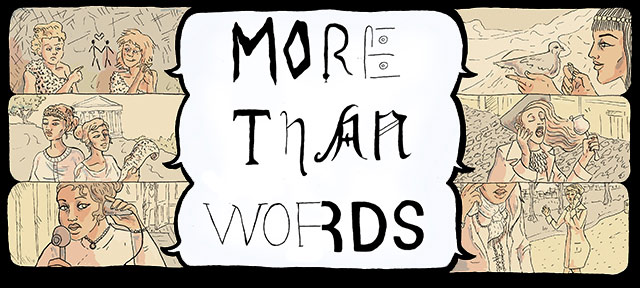
It’s the end of the year, and everyone’s throwing together Word Of The Year lists. While most of them are full of politically and socially loaded choices (and have spawned a million articles that take the bait), as I clicked through them, I felt something was missing. And then it hit me: they weren’t linguistically loaded enough. A true word of the year comments on itself.
Once I had my criteria in place, I couldn’t pick just one word. There are so many I didn’t get to write about this year. I also felt suddenly limited by the idea — what about a phrase of the year, or a dialect, or a trend? With the exception of April, during which nothing happened, 2013 was full of wordy happenings. People in positions of authority began to understand that what we call things affects how we think about them. The mainstream media’s gaffes magnified mistakes that are woven so deeply into our society, they come out of our anchor’s mouths practically unbidden. The words we popularized by correcting those errors rose to a prominence that was long overdue. AND: Disney tried to copyright Dia De Los Muertos.

GAH
Come on this journey with me, please. I can’t do it alone.
JANUARY
In January, Congress’s Gang of Eight unveiled the draft framework of what eventually became the Border Security, Economic Opportunity, and Immigration Modernization Act of 2013. Careful observers noticed that, within the framework’s bulleted hopes and dreams, there was a broader change — the bill’s language contained hardly any references to “illegal immigrants,” instead using terms like “undocumented” and “unauthorized.” Although activists, the National Association for Hispanic Journalists, and all sorts of other decent people have been calling for this change for years, the final squeeze probably came courtesy of a memo from The Hispanic Leadership Network, an “advocacy action group” led by Jeb Bush that “focuses on engaging the Hispanic community on center-right policies.” The memo urged GOP members to “consider tonally sensitive messaging points” when speaking about immigration issues (compare this with a strategic memo from 2005, which instead instructed Republicans to “Always refer to people crossing the border illegally as “illegal immigrants” — NOT as “illegals”).
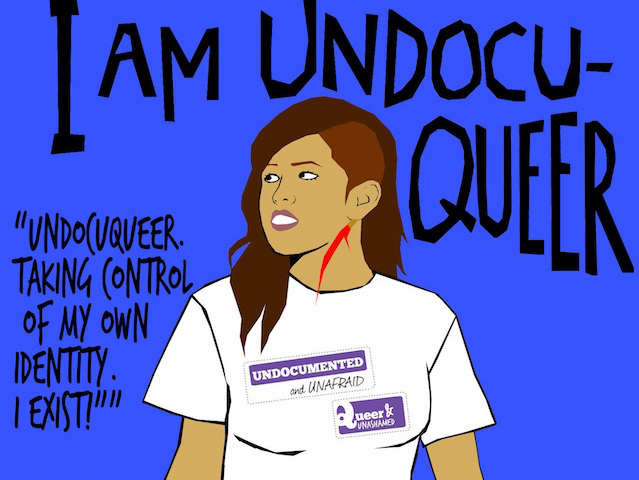
(VIA UNDOCUQUEER)
Was this a sign of true (if achingly slow) change on the Hill? Or just another example of improved rhetoric masking bad actions? If this immigration bill ever reaches the House, maybe we’ll be able to tell. But if, as undocumented journalist and activist Jose Antonio Vargas puts it, “language belongs to the people whose stories are being told,” it sounds like at least some people are listening — at least enough to make the pollsters run scared.
FEBRUARY
February saw the release of a study examining the differences between how men and women tweet. Some linguists and computer scientists from Carnegie Mellon University combed through the life’s work of about 14,000 twitterers and looked for trends. Although their methodology and conclusions were kind of interesting (men swear more! women tennnnd to lengthennnn their writttennnn speeeeechhhh!), the study was notable on a larger scale for launching a torrent of news stories that dumbed it down and said nothing interesting.

IIII LOOOOOVVVVEEEEE MOOOORRRREE THAAANNNNN WORRRRRDDDDSSSS
This pattern would repeat throughout the year, as we were treated to media freakouts about uptalk and the reanimation of an old, dead, totally false nugget wherein a study of baby rats was reinterpreted to mean that women talk three times as much as men. Lazy journalists love men’s brains/women’s brains stories not because they give us an opportunity to consider ways in which society trains our brain’s wires to cross, but because they provide “scientific” explanations for behavior that people don’t want to change anyway, as well as endless opportunities to make jokes about how women hate football and men can’t do the dishes, am I right!? What if we had less of that in 2014, I wonder.
MARCH
In March, the Steubenville sexual assault trial turned the mainstream news media into a monthlong nightmare. Some outlets took the opportunity to literally use words for evil — several revealed the name of the victim, while a CNN anchor expressed sympathy for “two young men that had such promising futures… who literally watched as they believed their life fell apart,” violently missing the point. On the other hand, some of the coverage did its job well. Although the term “rape culture” was first popularized by feminists in the 1970s, March 2013 was when many people (including me!) first became aware of — if not the idea itself — a concise way to express it. Google Trends shows that the phrase’s search frequency spiked the week of March 17th, and stories everywhere from The Nation to Forbes didn’t shy away from the concept. I’m glad — I think it’s the most useful word I learned this year.
APRIL

NOTHING TO SEE HERE
MAY
In May, The Walt Disney Company quietly filed papers to trademark the phrase “Dia De Los Muertos” “across several platforms” including clothing, books, breakfast cereals, fruit preserves, jewelry, fanny packs, binoculars, and snow globes. Don’t worry, this paragraph is really short! After an immediate outcry, Disney withdrew the patent applications, saying that they’d changed the title of the film that had inspired the patents so they didn’t need them anymore. Way to be little mouses about it, Disney.
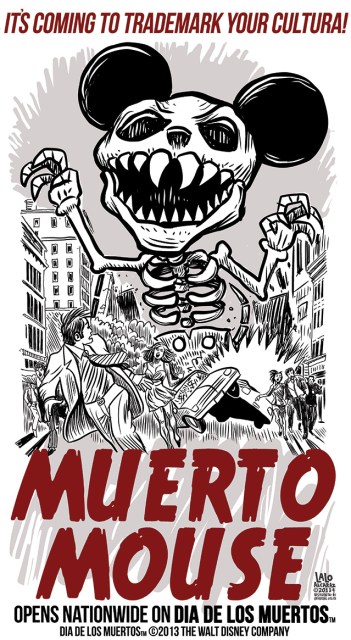
(VIA LALO ALCARAZ)
JUNE
In June, the Oxford English Dictionary and Microsoft Word’s in-program dictionary both added the word “transphobia” to their pages. The word appears in the 2013 edition of each, defined as “an extreme and irrational aversion to transsexuality and transsexual or transgender people.” The addition was inspired by a petition by the GRIN Campaign that garnered over 9,000 signatures. The OED is well-respected and sourced constantly — many treat it like a giant cube of pure authority. And everyone knows how that red squiggly Microsoft Word underline can make you doubt your own last name. It’s great that now neither of them erase a real problem by excluding this important word.

THANKS, CLIPPY.
JULY
The Year of Horrible Trials continued in July, as George Zimmerman was found not guilty of murdering Trayvon Martin, the young black man that he murdered. Many media outlets turned the whole thing into a sideshow act, but they were especially brutal to Rachel Jeantel, a friend of Martin and the prosecution’s star witness. Many viewers were also less than kind. Brittney Cooper wrote brilliantly at Salon about how Jeantel’s way of speaking, and common reactions to it, could be read as yet another microcosm of how we deal with race in America:
“[Cultural] grammars rely on language, on a way of speaking and communicating, to give them power. And Rachel Jeantel has her own particular, idiosyncratic black girl idiom, a mashup of her Haitian and Dominican working-class background, her U.S. Southern upbringing, and the three languages — Hatian Kreyol (or Creole), Spanish and English — that she speaks. The unique quality of her black vernacular speaking style became hypervisible against the backdrop of powerful white men fluently deploying corporate, proper English in ways that she could not do. The way they spoke to her was designed not only to discredit her, but to condescend to and humiliate her… What we witnessed with Jeantel was a deliberate attempt by the defense to mis-hear and misunderstand her… Given the hostile and combative space into which she entered, a space in which she had to fight for the integrity of her own words, combativeness seems like the most appropriate posture.”
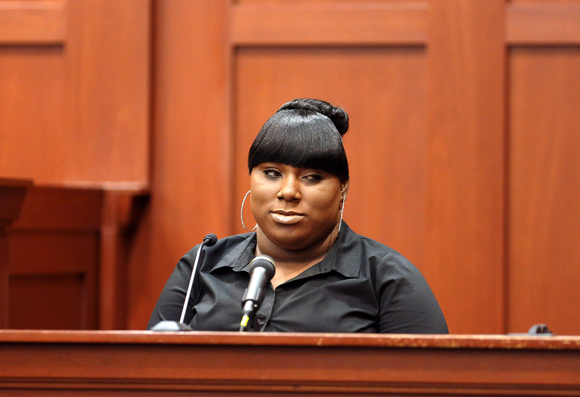
RACHEL JEANTEL ON THE WITNESS STAND (VIA THE NEW YORKER)
AUGUST
In August, Chelsea Manning released a statement in which she came out as trans*. In the statement, she requested that everyone refer to her by her preferred name and pronouns. This is very easy (as The Cut pointed out, it’s less of a change than typing Snoop Lion), and is also good journalism, but sadly, a lot of people were really bad at it, including ABC News, CBS News, The New York Times, and Reuters. Amanda Marcotte on Slate’s XX Blog explained that, for many, it was difficult to “refer to Manning’s gender in a way that balances respect for the right of individuals to determine their own gender identity with the need for clarity in reporting.” However, that is literally a reporter’s job (and many stylebooks provide good guidelines!). So hopefully people will start doing their jobs someday. Maybe in 2014, even. Props to Manning for blazing yet another trail — regardless of how you feel about the legality of her actions, she’s proven herself to be brave in about 2349320 different ways.

CHELSEA MANNING (VIA PDXQ CENTER)
SEPTEMBER
In September, The New York Times released an interactive feature called “What Was, Is, and Will Be Popular.” Along with socioneuropoliticoculturogrammatical analyses of everything from the Black Eyed Peas to Snickers Bars, this included a list of “The Most Popular Pet Names in America” and “The Most Popular Baby Names in NYC.”
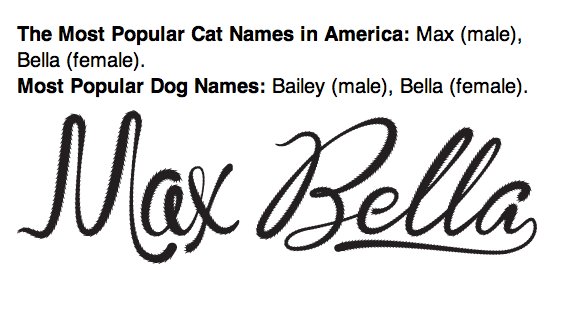
LOOKS LIKE EVERYONE IN AMERICA HAS A 16-YEAR-OLD SISTER
Everyone in the entire world sent me this infographic, just like everyone in the entire world sent me the New York Times Dialect Quiz and those colorful map gifs where you can see what baby names were popular during different decades. This sparked a lot of thoughts about how closely language and identity are entwined — we’re endlessly fascinated by how we have this name because we’re from this place, or this decade; how our upbringing has cursed us with accents we will or won’t cop to. Of course, it’s all more complicated than an interactive can understand.
OCTOBER
In October, a Portland-based dance-rock band called The Slants, which has a huge Asian-American fanbase and is made up entirely of Asian-American musicians, duked it out with the US Patent and Trademark Office in a federal circuit court. It wasn’t the first time and it won’t be the last — The Slants have been trying to trademark their name since 2009, but the USPTO has refused on the grounds that it’s “scandalous” and derogatory. Bassist Simon Tam says that this read on the word is itself racist, as a slant can be many things:
“In fact, the implication is that if we weren’t Asian, there wouldn’t be any problems because people wouldn’t associate our name with an obscure racial slur… And while it’s true that the people in the band can be identified by a band’s name, it doesn’t necessarily mean that the members literally embody the name of the band. No one thinks ‘The Rolling Stones‘ are literal masses of undulating rock or that ‘Led Zeppelin‘ is a metallic reincarnation of the Hindenburg blimp.”

THE SLANTS (VIA ALTSOUNDS)
Even if they agreed with the USPTO’s specific definition of the word, they should still have a case. Reclamation is a powerful, legitimate, and increasingy visible way for a community to deal with oppression, and the patent office seems confused about when and where it applies this argument. The band lost their October case, but will likely appeal it — keep an eye on their Facebook page for updates. And for more background about slurs, reclamation, and US patents, feel free to check out this earlier More Than Words about Dykes On Bikes, who eventually won a similar battle.
NOVEMBER
In November, Miami Dolphin Richie Incognito, who is white, was suspended indefinitely after using what is widely regarded as the #1 worst racial slur. Over the next couple of weeks, several other people of varying races also used this word, sparking what Ta-Nehisi Coates described as “a fairly regular ritual debate” over who is allowed to say it. Coates’s essay was the best thing to come out of all this and I’m going to link it and NOT excerpt it so that you read the whole thing. Here it is.
DECEMBER
It’s now December, and still the words come flying thick and fast and show no sign of stopping. So many terrible, wonderful words! On the terrible side, we have “affluenza,” a word that means something along the lines of “what happens when you’re so rich that you no longer care about anything real.” The word has been invented many times, most recently by a sociologist in 2001 in order to describe a scary phenomenon, and also to sell books. This month, it was invoked by an expert witness who testified during the trial of a teenager from a very wealthy family who killed four people while driving drunk. The teenager was sent to a treatment facility instead of jail. While this idea — that being cushioned from consequences your whole life can seriously mess with your sense of humanity — probably has something to it, it’s probably best not to treat affluenza by continuing to cushion its “sufferers” from consequences on an institutional level. At least everyone’s baffled reactions have quickly given the word the satirical bent it should have had from the beginning.

YOU KNOW YOU HAVE AFFLUENZA WHEN: DIVING INTO A POOL OF METAL CAUSES YOU NO PAIN
In better news, earlier this month marked the first-ever White House summit on drug policy reform, during which psychiatrist and recovery research expert John Kelly urged policymakers to rethink the way they talk about the people they are supposed to be helping. “The rhetoric and language of ‘the war on drugs’ talks about ‘abuse’ and ‘abusers,’” Kelly explained. “The new movement, toward smarter criminal justice and a more public health approach, needs to look at it as a medical condition and talk about it as ‘substance use disorder,’ which is more accurate medical terminology.”
Disease terminology for actual diseases! It’s so crazy it just might work. I look forward to finding out in 2014.
This has been the twenty-seventh installment of More Than Words, where I take queer words of all sorts and smash them apart and see what makes them tick. Every week I dissect a different word, trying to figure out where it came from, how it has evolved, where it might be going, and what it all means. It’s like reading the dictionary through a prism. Feel free to send word suggestions to [email protected].
Header by Rory Midhani



I love this column. Being a massive language geek, it was how i first discovered autostraddle, so thank you!
thank you, Fifi! keep coming back!
I love this! Really interesting approach to reviewing news stories from this year from a linguistic perspective.
thanks Sam! happy new year!
Pieces like this one and The Ta-Nehisi Coates article you referenced make me momentarily wish I was all up on this social networking gig so that I could post them time and time again and spread the words of wisdom for the world to read.
i’m honored. the rest of the Brittney Cooper one is really good too!